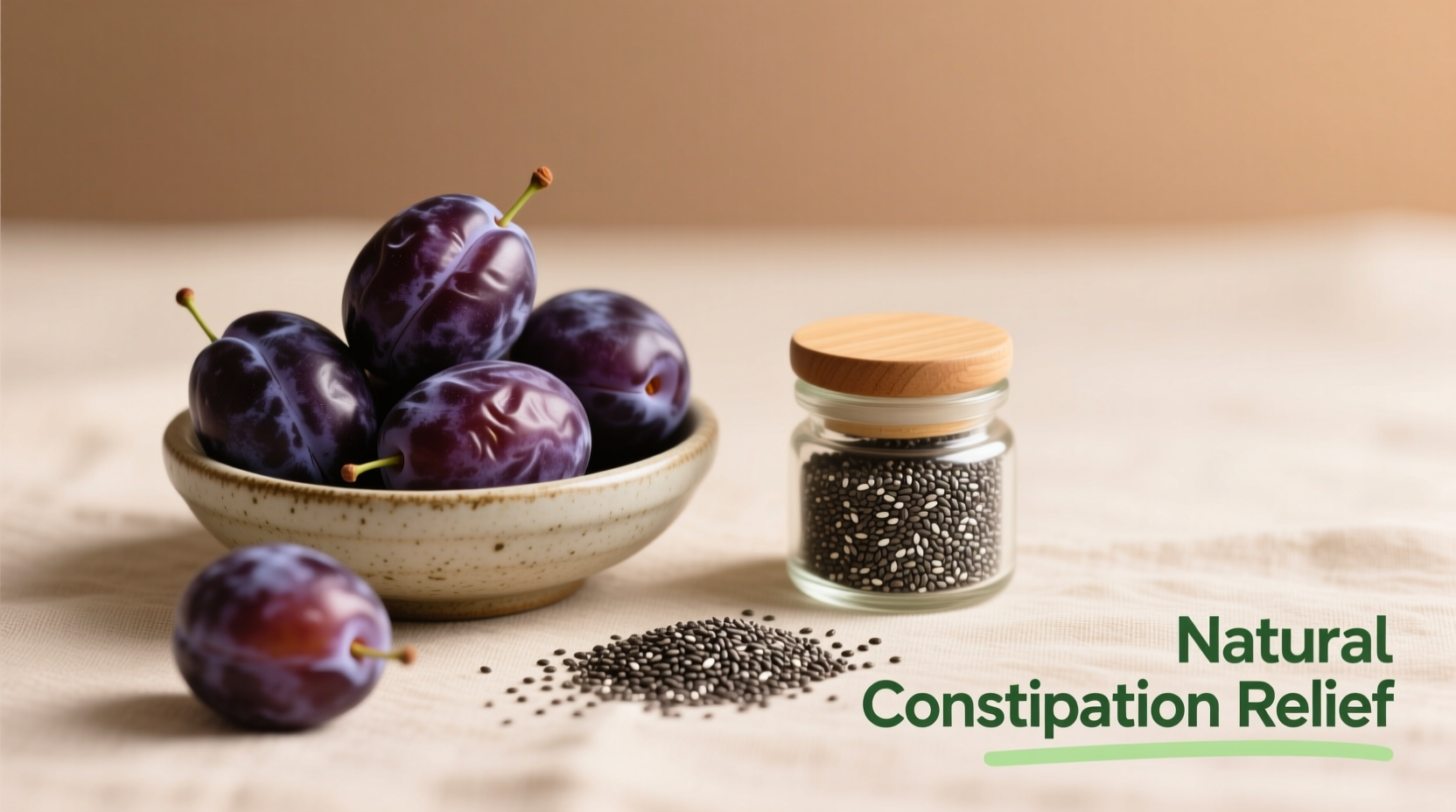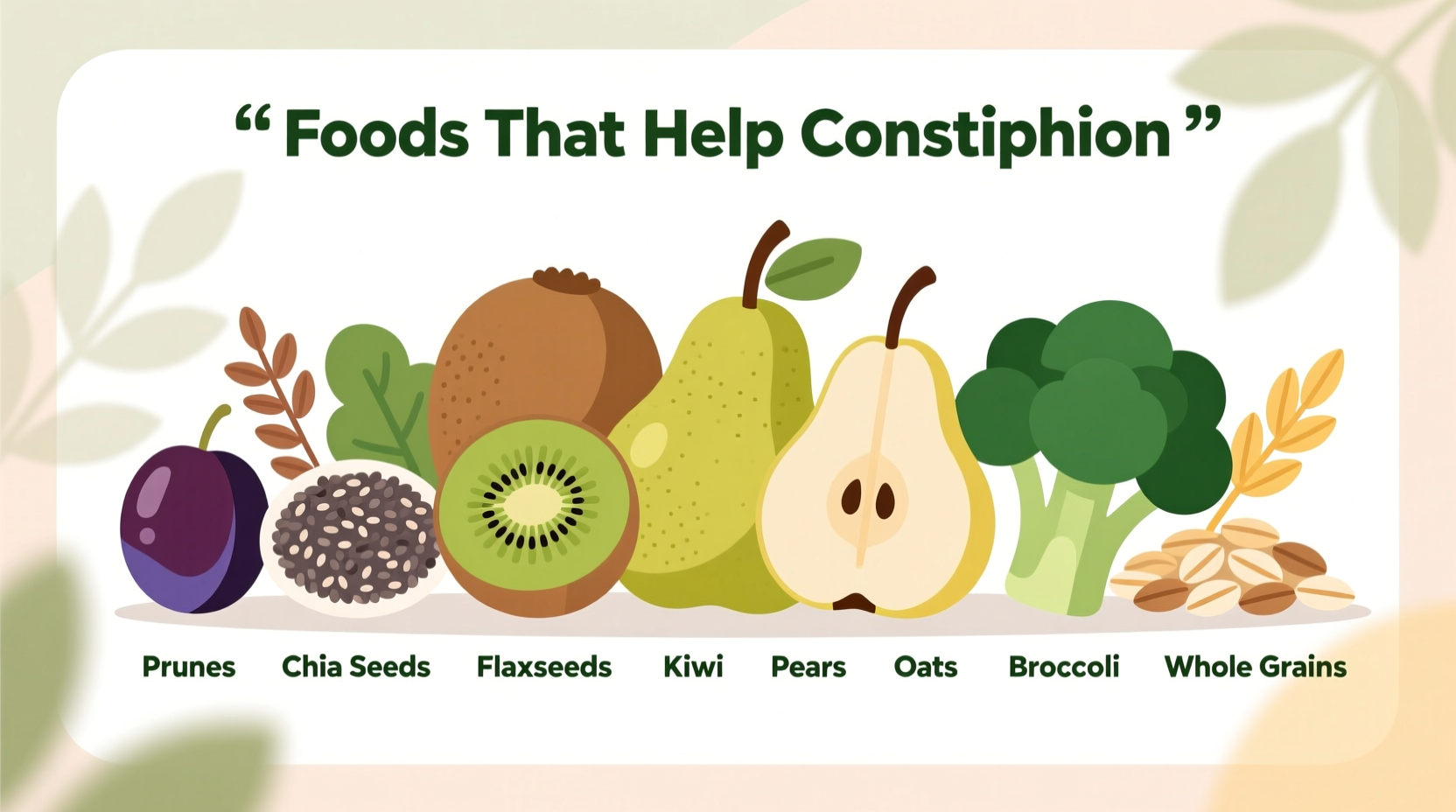When constipation strikes, your kitchen holds the most effective natural remedies. As someone who's helped thousands of home cooks understand the science behind food and digestion through my work in professional kitchens and culinary education, I've seen how strategic food choices can transform digestive health. Unlike laxatives that create dependency, these dietary solutions address the root cause while nourishing your body.
The Science Behind Constipation-Relieving Foods
Constipation occurs when stool moves too slowly through your digestive tract, often due to low fiber intake, dehydration, or lack of physical activity. The National Institute of Diabetes and Digestive and Kidney Diseases (NIDDK) explains that dietary fiber adds bulk to stool and draws water into your colon, creating the ideal consistency for easy elimination (NIDDK, 2023).
Most adults need 25-38 grams of fiber daily, yet the average intake is only 15 grams. This significant gap explains why 16 million Americans visit doctors annually for constipation relief. The good news? Increasing fiber intake through whole foods can resolve mild constipation in 2-3 days when implemented correctly.
Top 5 Evidence-Based Foods for Constipation Relief
1. Prunes and Dried Fruits
Prunes outperform other dried fruits for constipation relief due to their unique combination of fiber (3g per 1/4 cup), sorbitol (a natural sugar alcohol), and dihydrophenylisatin compounds that stimulate intestinal contractions. A clinical study published in Alimentary Pharmacology & Therapeutics found that 50g of prunes daily (about 7 medium prunes) significantly improved stool frequency and consistency compared to psyllium husk (Attaluri et al., 2014).
Pro tip: Soak prunes in warm water for 10 minutes before eating to enhance their natural laxative effect. Pair with 8 ounces of water for maximum effectiveness.
2. Chia and Flax Seeds
These tiny powerhouses deliver 10g of fiber per ounce, with the unique ability to absorb 10-12 times their weight in water. When soaked, they form a gel-like substance that lubricates the digestive tract. The Academy of Nutrition and Dietetics recommends 1-2 tablespoons of soaked chia seeds daily for constipation relief (AND, 2022).
| Seed Type | Fiber per Ounce | Omega-3 Content | Best Preparation Method |
|---|---|---|---|
| Chia Seeds | 10g | 5g | Soak 15 mins in 6x water |
| Flax Seeds | 8g | 6g | Grind before consumption |
| Hemp Seeds | 3g | 8g | Use raw or toasted |
3. Leafy Greens and Cruciferous Vegetables
Spinach, kale, and broccoli contain both insoluble fiber (for bulk) and magnesium (which draws water into the intestines). One cup of cooked spinach provides 4g of fiber and 157mg of magnesium—nearly 40% of your daily requirement. The Mayo Clinic notes that magnesium deficiency is a common but overlooked cause of chronic constipation (Mayo Clinic, 2023).

4. Whole Grains
Bran cereals, oats, and quinoa deliver both soluble and insoluble fiber. A single serving of All-Bran cereal contains 10g of fiber—more than most fruits and vegetables combined. Research in the World Journal of Gastroenterology shows that whole grain consumption increases stool weight by 27% and reduces transit time by 30 hours on average (McRorie & McKeown, 2014).
5. Hydration Essentials
No fiber works without adequate water. The critical ratio is 1 part fiber to 4 parts water. When increasing fiber intake, add 8 ounces of water for every 5g of additional fiber. Herbal teas like senna and peppermint provide dual benefits—senna stimulates colon contractions while peppermint relaxes intestinal muscles.
Implementation Timeline: What to Expect
Understanding the digestive timeline prevents frustration when implementing dietary changes:
- First 24 hours: Increased water intake provides immediate softening effect
- Days 2-3: Fiber begins adding bulk to stool; may initially cause bloating
- Days 4-7: Regular bowel movements typically resume with consistent intake
- Week 2: Gut microbiome adapts to higher fiber diet for sustained relief
Gradual implementation is crucial—add 5g of fiber daily to avoid gas and cramping. Start with one serving of prunes on day one, add chia seeds on day three, then incorporate greens on day five.
When Food Solutions Aren't Enough: Critical Boundaries
Dietary approaches work for 85% of occasional constipation cases, but certain situations require medical attention. The American Gastroenterological Association identifies these red flags (AGA, 2022):
- No bowel movement for more than 7 days
- Blood in stool or rectal bleeding
- Sudden constipation with abdominal pain
- Unintentional weight loss
- Constipation alternating with diarrhea
These symptoms may indicate underlying conditions like bowel obstruction, colon cancer, or thyroid disorders that require professional diagnosis.
Your 3-Day Constipation Relief Plan
Based on my experience teaching digestive health workshops, this practical plan delivers results:
| Meal | Day 1 | Day 2 | Day 3 |
|---|---|---|---|
| Breakfast | 1/2 cup prunes + Greek yogurt | Chia pudding (3 tbsp soaked) | Oatmeal with flax seeds |
| Lunch | Spinach salad with avocado | Kale smoothie with banana | Broccoli quinoa bowl |
| Dinner | Roasted Brussels sprouts | Steamed asparagus | Green beans with almonds |
| Hydration | 64 oz water + 1 herbal tea | 72 oz water + 2 herbal teas | 80 oz water + 3 herbal teas |
Remember to chew thoroughly—digestion begins in the mouth. I've found that many people rushing meals compromises their digestive process before food even reaches the stomach.
Avoid These Common Mistakes
From my years teaching cooking classes, these pitfalls sabotage constipation relief efforts:
- Adding too much fiber too quickly: Causes painful bloating and gas
- Drinking coffee instead of water: Caffeine dehydrates and counteracts fiber benefits
- Eating raw vegetables exclusively: Cooked greens are gentler on sensitive digestive systems
- Ignoring physical activity: Walking 20 minutes daily stimulates intestinal contractions
For immediate relief during severe episodes, try the "prune power shot": blend 3 prunes, 1 tbsp chia seeds, and 4 oz warm water. This concentrated dose works within 4-6 hours for most people.











 浙公网安备
33010002000092号
浙公网安备
33010002000092号 浙B2-20120091-4
浙B2-20120091-4